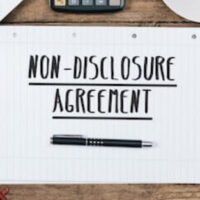Do You Need a Non-Disclosure Agreement?

Nowadays, technology and trade secrets are big factors in businesses. It seems as though every company has special processes and materials used to create their goods and services. Nobody wants to fall prey to competitors. It is already commonplace to see smaller companies trying to knock off clothing, handbags and other products in order to make a profit.
To prevent this from happening, many companies ask employees to sign non-disclosure agreements. These documents outline what information is confidential and prohibit employees from using this information to help competitors. The agreements also outline what will happen if they break the agreement. They are legally binding and can result in litigation, fines and even jail time.
Not all companies require non-disclosure agreements, though, nor are they always needed. Here are some things to consider if you are contemplating using such a document.
When to Use a Non-Disclosure Agreement
There are several situations in which a non-disclosure agreement is a good idea:
- You are sharing an invention or idea with a business partner or investor.
- You are sharing financial information with someone who may potentially buy your business.
- You are receiving services from someone who has access to sensitive information.
- You have employees who have access to proprietary or confidential information.
Key Elements to Include
If you think you might need a non-disclosure agreement, the first thing to determine if you need a one-sided or mutual agreement. Most agreements are one-sided, which means that one party is getting information from the other party. A mutual agreement is required if both parties are receiving sensitive information from each other and want to protect it.
A well-written non-disclosure agreement should not be too lengthy. Around two pages is best. An agreement should include several key elements. The document should:
- Identify the parties involved. This usually involves two parties—the disclosing party and the recipient.
- Define the confidential information. Does the agreement refer to all information? Is oral information excluded?
- Outline the obligations of the person who is receiving the confidential information. The information must be kept secret. How can the recipient use it?
- Any exclusions. Sometimes there are situations in which withholding the information is unfair. The information may be publicly known or required to be disclosed during the legal process.
- The terms of the agreement. Does the NDA last forever or does it end after a certain period of time?
Other provisions may be needed, especially if it is possible the employee may the leave the company and share the secrets with a competitor.
Learn More About Non-Disclosure and Confidentiality Agreements
Non-disclosure and confidentiality agreements are becoming more commonplace nowadays. While some are truly beneficial documents, others are way out of line and actually do more harm than good for employees.
If you are asked to sign one of these agreements, make sure your rights are protected. Seek help from Orlando non-disclosure & confidentiality agreement lawyer B.F. Godfrey from Godfrey Legal. Each agreement is unique and tailored to specific circumstances, but should not be too limiting. To schedule a consultation, fill out the online form or call (407) 890-0023.
Resource:
forbes.com/sites/allbusiness/2016/03/10/the-key-elements-of-non-disclosure-agreements/#63995a09627d
